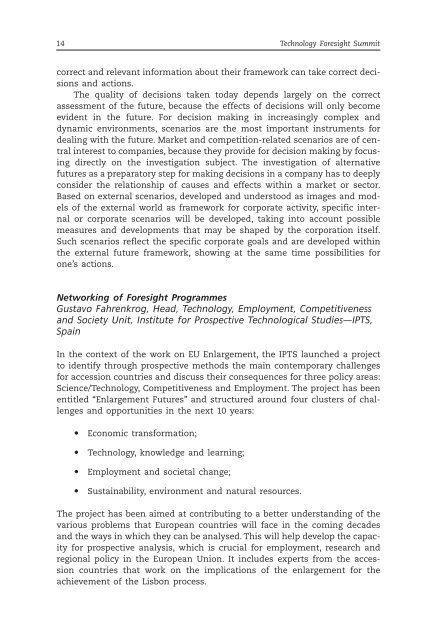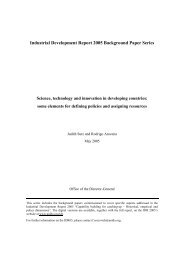TECHNOLOGY FORESIGHT SUMMIT - Unido
TECHNOLOGY FORESIGHT SUMMIT - Unido
TECHNOLOGY FORESIGHT SUMMIT - Unido
You also want an ePaper? Increase the reach of your titles
YUMPU automatically turns print PDFs into web optimized ePapers that Google loves.
14 Technology Foresight Summit<br />
correct and relevant information about their framework can take correct decisions<br />
and actions.<br />
The quality of decisions taken today depends largely on the correct<br />
assessment of the future, because the effects of decisions will only become<br />
evident in the future. For decision making in increasingly complex and<br />
dynamic environments, scenarios are the most important instruments for<br />
dealing with the future. Market and competition-related scenarios are of central<br />
interest to companies, because they provide for decision making by focusing<br />
directly on the investigation subject. The investigation of alternative<br />
futures as a preparatory step for making decisions in a company has to deeply<br />
consider the relationship of causes and effects within a market or sector.<br />
Based on external scenarios, developed and understood as images and models<br />
of the external world as framework for corporate activity, specific internal<br />
or corporate scenarios will be developed, taking into account possible<br />
measures and developments that may be shaped by the corporation itself.<br />
Such scenarios reflect the specific corporate goals and are developed within<br />
the external future framework, showing at the same time possibilities for<br />
one’s actions.<br />
Networking of Foresight Programmes<br />
Gustavo Fahrenkrog, Head, Technology, Employment, Competitiveness<br />
and Society Unit, Institute for Prospective Technological Studies—IPTS,<br />
Spain<br />
In the context of the work on EU Enlargement, the IPTS launched a project<br />
to identify through prospective methods the main contemporary challenges<br />
for accession countries and discuss their consequences for three policy areas:<br />
Science/Technology, Competitiveness and Employment. The project has been<br />
entitled “Enlargement Futures” and structured around four clusters of challenges<br />
and opportunities in the next 10 years:<br />
<br />
<br />
<br />
<br />
Economic transformation;<br />
Technology, knowledge and learning;<br />
Employment and societal change;<br />
Sustainability, environment and natural resources.<br />
The project has been aimed at contributing to a better understanding of the<br />
various problems that European countries will face in the coming decades<br />
and the ways in which they can be analysed. This will help develop the capacity<br />
for prospective analysis, which is crucial for employment, research and<br />
regional policy in the European Union. It includes experts from the accession<br />
countries that work on the implications of the enlargement for the<br />
achievement of the Lisbon process.

















